This issue opened with a poem titled “A CLUSTER OF NEVERS,” from Selected, followed by a fictionalized conversation between two boys traveling to their homes in the west from Carlisle titled “TWO BOYS TALK IN THE CARS ON THEIR WAY HOME: WHAT THEY MAY HAVE SAID.” In the conversation, “Ira” and “Bart” muse about their appreciation of…
Cumberland County Historical Society
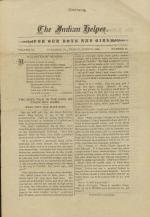
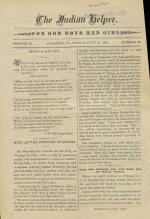
The first page opened with the poem "What a Jug Did," reprinted from An Old Scrap Book followed by a piece called "Nice Letter from Mr. Standing," made up of abstracts from his trip West returning Carlisle students to their home agencies. Standing mentioned there was a special travel car for girls and sick students, and described his…
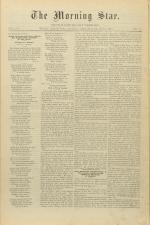
A description of this document is not currently available.
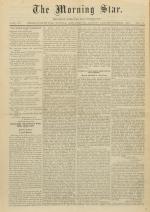
A description of this document is not currently available.
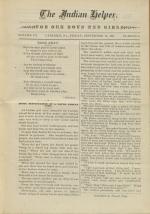
The first page opened with the poem, "Bang Away," followed by the story of a Carlisle girl who was horrified to return home to unsanitary conditions, continued on page four. This appears to be the beginning segment of a serialized story of a girl who returned home to the challenges of putting her new-found skills learned at Carlisle, in…
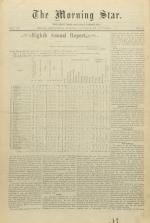
A description of this document is not currently available.
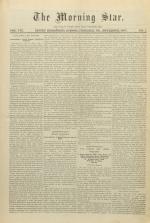
A description of this document is not currently available.
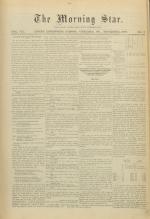
A description of this document is not currently available.
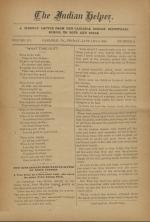
The first page opened with a poem, "What Time Is It?" followed by the story of Indian women whose harvested cache of vegetables had been stolen. The story was titled, "How Some Indians Were Made to Suffer by Their Enemies: A True Story by a Dear, Kind Lady Who Lived For Many Years Among Them." It was signed by A-TE-KA, aka "Aunt Martha," as…
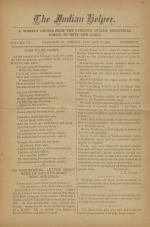
The first page opened with a poem, "How To Be Happy" followed by a reprint of a letter to the school from J. H. Seger of the Cheyenne and Arapahoe Agency dated Jan 4, 1888 that mentioned several students who returned to the Agency. Page two gave a humorous offering by Nellie Carey (Apache) from "her new place in the country," advice for the…
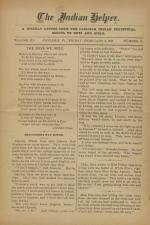
The first page opened with a poem, "Big Fraid and Little Fraid" followed by an article, "Another Pleasant Evening in the Chapel," that detailed the entertainment featuring numerous students reciting or singing poems, songs and reports. It continued on page four, which is missing from the collection. Page two included a reference to the borough'…
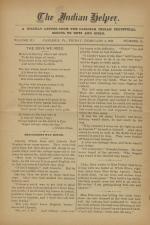
The first page opened with a poem, "The Boys We Need," reprinted from "Golden Days;" followed by a fictitious fable of two Carlisle students, "The Longest Way Round," warning against taking shortcuts. The page also included two blurbs about the blizzard in the West. Page two opened with a feature "What the Man-on-the-band-stand Heard Some…
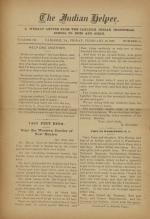
The first page opened with a poem, "Help One Another," reprinted from "Chambers, Journal;" followed by "7482 Feet High," a letter to the Man-on-the-Band-Stand from M. Burgess, about her journey to California. This page also began a letter from Peoria student Edith Abner, entitled "Visit to Washington D.C." which continued on the fourth page.…

The first page opened with a poem, " A Short Sermon," followed by a letter to the Man-on-the-Band-Stand dated Feb 7, 1888 from M. Burgess, entitled "A Sleeping Car," about the comforts of traveling in a sleeping car, which continued on page four. Page two featured a report called "The Full Exhibit Of The Carlisle Indian School, For…
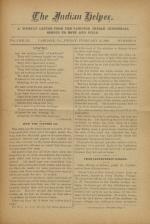
The first page opened with a poem, "Sowing," followed by the article, "How the Letters Go," that described the process of express mail retrieval and distribution from trains. Then came a letter from former student John Dixon [Dickson] (Pueblo) who wrote about his experiences translating for and recruiting students for the Albuquerque Indian…
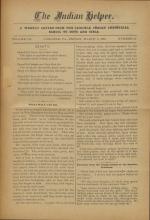
The first page opened with a poem, "Beauty," followed by the article, "What Will Can Do," and "Extracts from the Compositions of the Smaller Scholars." Page two began with "His Lesson," about atoning for bullying, reprinted from "Bright Jewels," followed by several articles, "Little Things," "School," and a letter to the Man-on-the-Band-Stand…
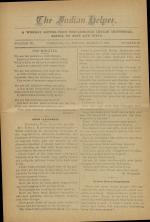
The first page opened with a poem, "The Minutes," followed by Marianna Burgess' letter "From California," to the Man-on-the-Band-Stand describing idyllic weather compared to what she's hearing of blizzard conditions at the school. The second page began with an account of the visit and talk by Mr. Kanzo Uchumiura, a Japanese student visiting the…
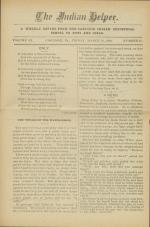
The first page opened with a poem, " Only," followed by a piece called "The Voyage of the Water Drops," about how rain is formed. The last article on this page is called "A Hero," about how the actions of a quick thinking boy saved a mine in Newcastle, England. The second page featured an article, "Mines," in which "Miss Alice" described the…
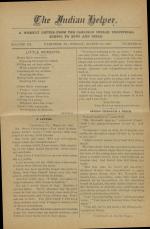
The first page opened with a poem, "Little Moments," followed by "A Letter," dated March 21, 1888 describing some of the Man-On-the-Band-Stand's observations. The next feature was an article about how to build a periscope. It was titled "Seeing Through a Brick," and continued on the fourth page. Page two included a detailed description of the…
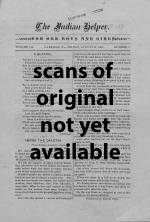
The first page opened with the poem, " A Proverb," followed by Jemima Wheelock's (Oneida) report of "Our Wilmington Trip," about a group of students traveling to Delaware where they stayed with families before they headed to Philadelphia with Capt. Pratt and Miss Leverett. They visited John Wannamaker's Store, the zoo, an iron factory and…
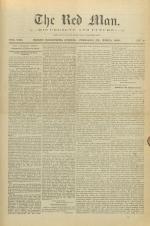
A description of this document is not currently available.
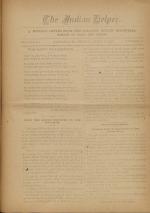
The first page opened with a poem "The Happy Philosopher," followed by "From the Indian Question to the Weather," a piece describing stereotypical prejudices and the importance of keeping Indians away from idle influences. Then came a report, "Our Guardhouse," extracted from essays by Richard Davis (Cheyenne) and Frank Dorian (Iowa) that…
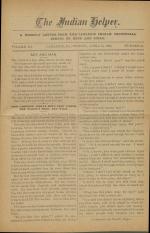
The first page opened with a poem, "Boy and Man," followed by "Two Carlisle Indian Boys Stop Under the Walnut Tree, and Talk," contrasting an honest, hard working boy to a lazy, ungrateful boy. It continued on the fourth page. Page two featured news and greetings from returned students, an article "School Room Sentences," that encouraged…
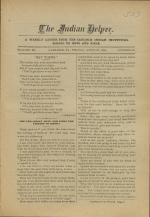
The first page opened with a poem, "Get There," followed by an editorial from Ethildred B Barry of Germantown, called "Are the Indian Boys and Girls the Friends of Birds?," on the treatment of birds. It continued on the fourth page. Page two opened with a piece describing the contents of the April "Red Man," a report from Susan Longstreth…
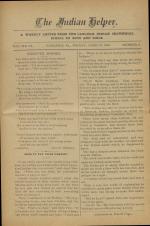
The first page opened with a poem by John G. Whittier, "Granted Wishes," followed by Aunt Martha's story, "Does It Pay to Be Unkind?" about a former Carlisle student's lack of cooperation by not translating business dealings from English after returning home. The second page featured news items about returned students, and a report about "The…
